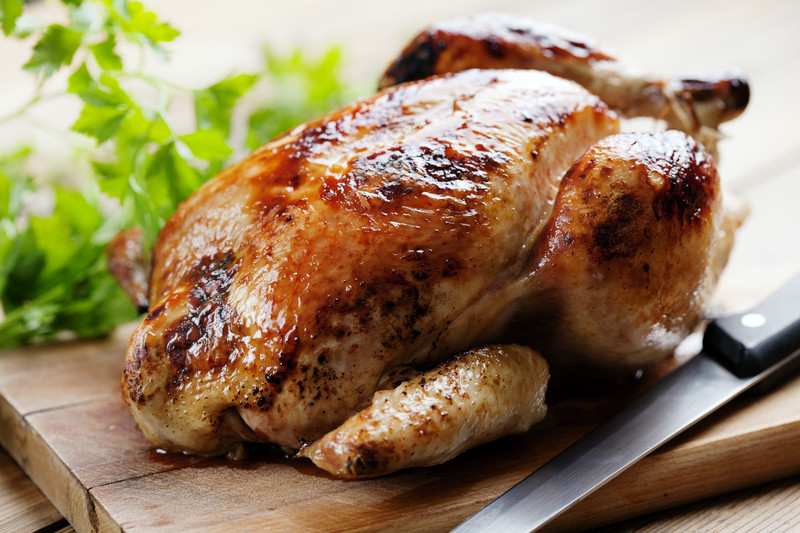Cooking Pasture Raised Chicken
posted on
October 11, 2022
Cooking Tips for Pastured Poultry
It's always important to have a thermometer ready when your cooking meats and the USDA says the safe temperature for poultry is 165. I tend to take the heat down once we hit 160 and let it rise slowly as it rests outside the heat source for 10-15 minutes. When you check the temps make sure to aim for the center of the thickest part of the meat.
Unlike a lot of grocery organizations, we do not keep meat at fresh temps and freeze it to keep it from going bad. Every bird we raise is flash frozen after packaging to lock in freshness. Since you'll be starting with a frozen bird you'll need to get it into the refrigerator to thaw two to three days ahead.
So, as you know, there's a couple of ways to approach cooking chicken or any of our meats really. You can go with moist heat or dry heat.
The moist heat route includes stewing, crock-pot, braising, insta-pot, etc. The dry heat approaches mostly include roasting, sautéing and grilling but you can mix moisture into these approaches as well. You can use different temperatures from low heat to high heat and you will end up with different cooking times in order to get the meat to temp.
It's fun to play around with different approaches and as you do you'll find that the longer moister cooking can tenderize even the toughest of poultry, like stew hens, releasing their incredible flavor.
Cooking pastured chicken at a high-heat can quick sear the cut to lock in the moisture and release the flavors.
Roasting a Whole Chicken, a "WOG" (without giblets)
Let's focus first on the roasting, grilling (with moisture, think beer can chicken), braising. Pat the thawed chicken dry with paper towels and put the bird into a baking pan, apply some light seasonings, salt & pepper, but don't overdo it because you want to enjoy the natural flavors of the pasture raised meat. Put the seasoned bird into the preheated oven at 325 and cook until you hit the 165 degree mark. Your gonna need an hour and half to two hours depending on the size of your chicken but make sure and start checking temp after the first hour.
Pasture raised chicken always seem to benefit from slower cooking and a good source of continuing moisture. Sometimes I'll go for a longer, slower cook in a 200-250 degree over. I know some prefer the quicker cook at higher heat, 450, to really seal the juices and crisp up the skin. It's really delicious, but watch those temps and don't overcook it!
A Variation on Roasting
Our Spatchcock cut whole chicken has been "butterflied" by removing the backbone completely so you can spread the bird out to allow it to cook more evenly. This really helps if you're getting some tough chicken in your current methods. Because it cooks more uniformly it will cook faster and more evenly eliminating some of those hot, tough spots. The shorter cooking time will also result in more moisture maintained in the meat which bastes the meat and gets you the crispy and tasty skin.
The Crock-pot, Insta-pot, braising Method
The crock-pot method takes a little longer to cook with a whole chicken requiring 3-4 hours, on high, and you can even cook a frozen chicken without thawing and on low if you have 8-10 hours. We often take this longer, lower, slower path here at the farm by taking a frozen chicken our first thing in the morning, apply some seasonings to the frozen bird, and place it in the crock pot on low. When we return late in the day the chicken is juicy, tender, flavorful and ready debone and serve.
Even with the Crock-pot approach, remember to let you meat cool before cutting so the meat stays juicy in case you want to put some away for later use. Once we have the chicken in the fridge, we have many quick meal solutions such as pasta, so many rice dishes, stir fries, in fried rice, etc.
As you enjoy the delicious, flavorful, tender pasture raised chicken, make sure you save those bones! We freeze our bones until we have a larger batch then we make bone broth to keep us loaded with the immunity boost that come from real pasture raised chicken bone broth. It's the only way we go through flu season!





